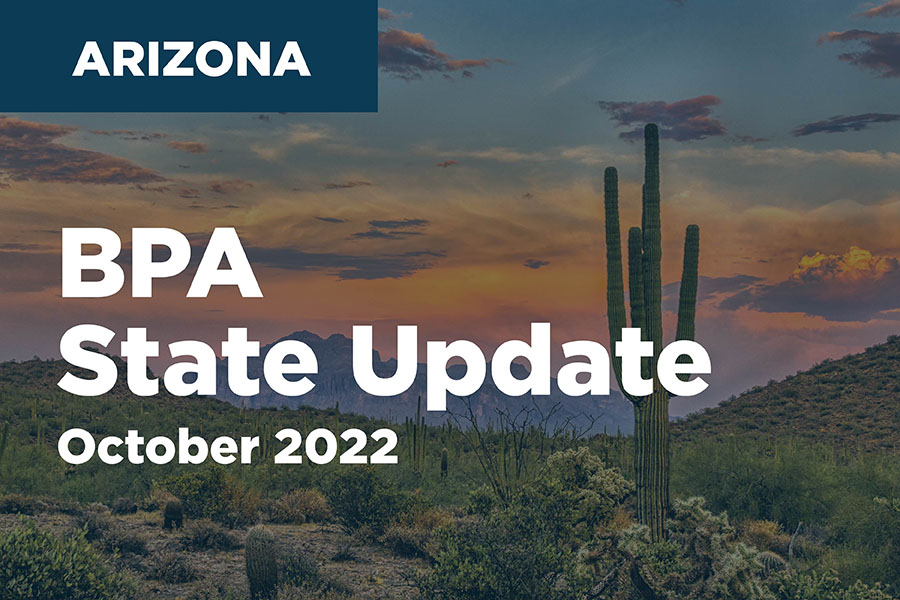
October 2022 – Arizona Policy Update
October 19, 2022
BPA tracks the latest policy updates and legislative issues in many states across the nation. See the latest policy information for Arizona as of October 2022.
Disclaimer: Inclusion of any bills/regulations in this state policy update does not equate to BPA’s endorsement.
The Arizona legislature concluded its 2022 session on June 25 without advancing two key bills introduced in Arizona this year impacting energy efficiency. These bills include legislation to enable local commercial property assessed clean energy (C-PACE) financing programs in the state (see HB 2742), and a bill updating appliance energy efficiency standards (see SB 1282).
With the session closing, the legislature announced the creation of a Joint Ad Hoc Committee on Energy to meet between “legislative sessions to convene and solicit information from experts and the public about the energy industry”. Composed of lawmakers from both chambers, the committee must take public input to produce a report for the legislature with opportunities to better service Arizona’s electric consumers and improve the reliability and affordability of diverse power generation, transmission, and distribution resources. The report is due to the Legislature by December 31, 2023. Further opportunities for public engagement are anticipated in the coming months.
Regulatory Monitor:
- During the September Open Meeting, the Arizona Commerce Commission voted to approve an amended Electric Energy Efficiency Implementation Plan (EEE Plan) and Demand-Side Management Tariff (DSM) for Navopache Electric Cooperative, Inc – the Arizona Electric Cooperative covering Eastern Arizona. The new EEE Plan is designed to achieve a cumulative energy efficiency goal of 2.3% for 2024, 3% for 2025 and 16.5% by the end of 2034 and includes energy efficiency incentives programs for residential and commercial customers such as the Light Emitting Diode (LED) Lighting Program, Residential Energy Audit Program, Community Education Program (CEP), Northern Arizona Council of Governments (NACOG) Weatherization Program and the Commercial Retro-Fit Rebate Program (Retro-fit Program). In total, ACC approved over $200,00 through a customer surcharge to fund these new programs that take effect immediately.
- After a 3-2 vote from the Arizona Corporate Commission in August, Tucson Electric Power Company (TEP) is required to reinvest $12.4 million in over-collected funds from its Energy Efficiency Plan and Demand-Side Management (DSM) surcharge program back into energy efficiency programs.
- The ACC has voted to approve each of the four state utilities’ integrated resource plans (IRPs). Upon approval of the IRPs, the ACC ordered the utilities “to maximize the value and cost-effectiveness of energy efficiency” in their next IRP filings and to work with stakeholders to develop one or more proposals for the Commission’s consideration to include Demand-Side Resources (such as smart thermostat installations and energy efficiency upgrades) as part of each utility’s capital investments. In addition, the ACC added an amendment that orders the state’s largest utilities, APS and TEP, to demonstrate 1.3% energy savings over the next three years and a plan to achieve demand-side resource capacity equal to at least 35% of 2020 peak demand by their next IRP filing. The ACC and state utilities have not released next steps on the implementation of IRPs at the time of this writing.
Legislative Monitor:
2022 Regular Session Dates: January 10 until June 25.
Bills considered but not passed in 2022:
- SB 1656 / HB 2742 Local C-PACE Requirements enables local governments to establish, operate, and enforce commercial property assessed clean energy (C-PACE) financing programs. Financing may be used for energy efficiency projects that are intended to decrease energy consumption or demand through the use of efficiency technologies, products, or activities. This bill also allows for local governments to jointly operate C-PACE programs on a broader regional basis. This bill was introduced to the House on February 10 and referred to the House Natural Resources Energy, and Water Committee.
- SB 1282 Product Efficient Energy Standards outlines 12 household and commercial appliance categories, including indoor air purifiers, residential ventilating fans, and water coolers, and applies minimum efficiency standards to them. The bill was introduced on January 24th and referred to the Senate Natural Resources Committee where it has not seen a vote in Committee.
